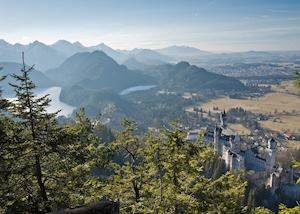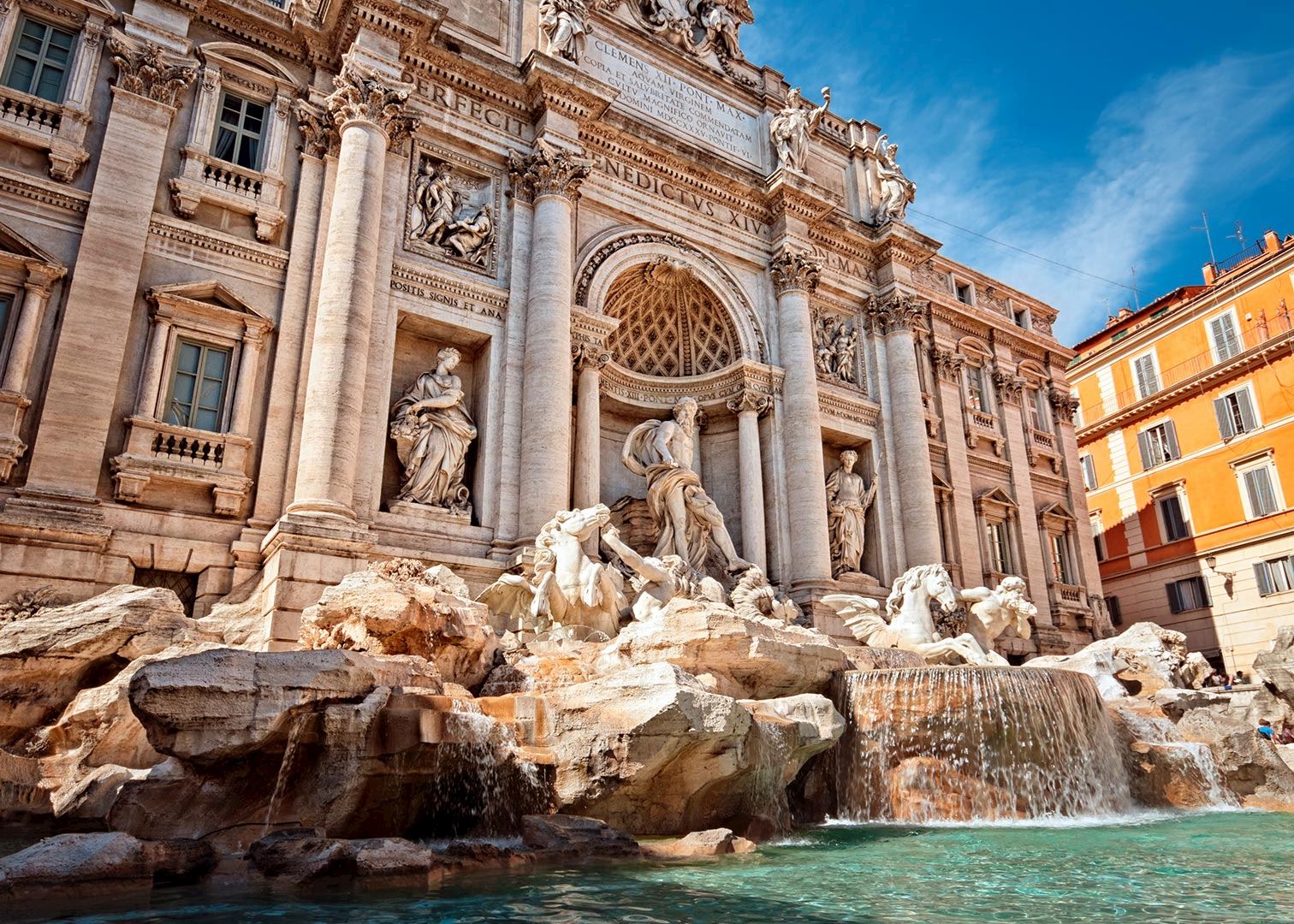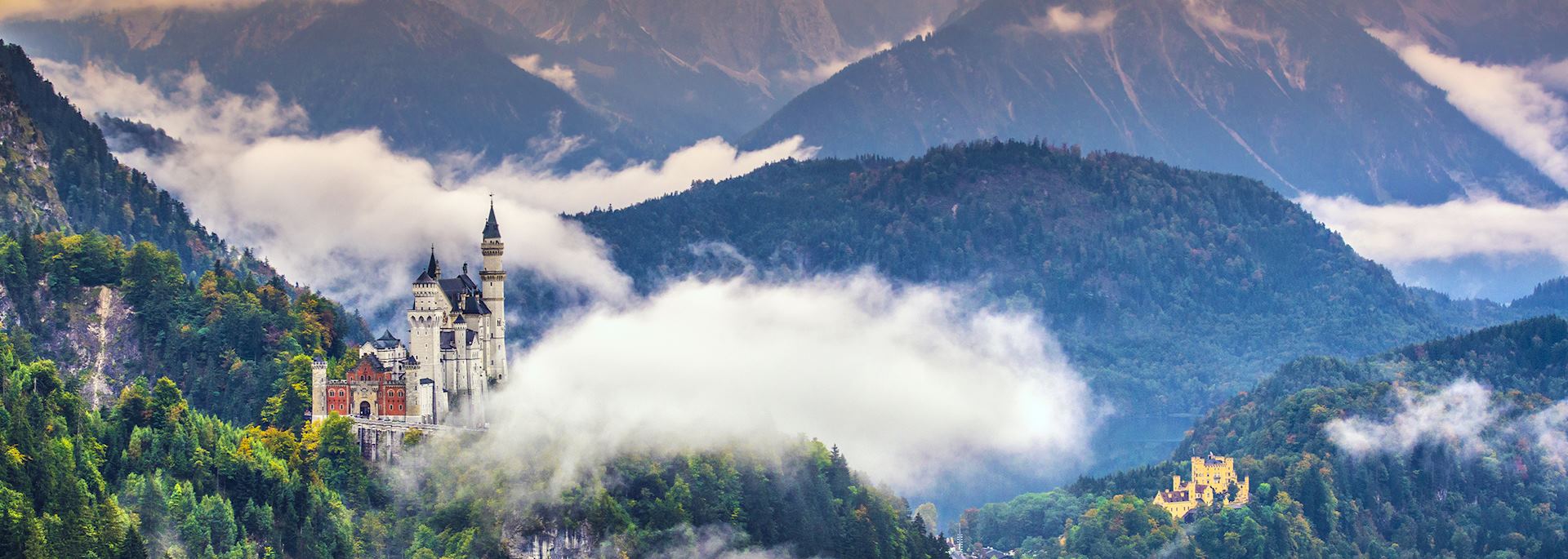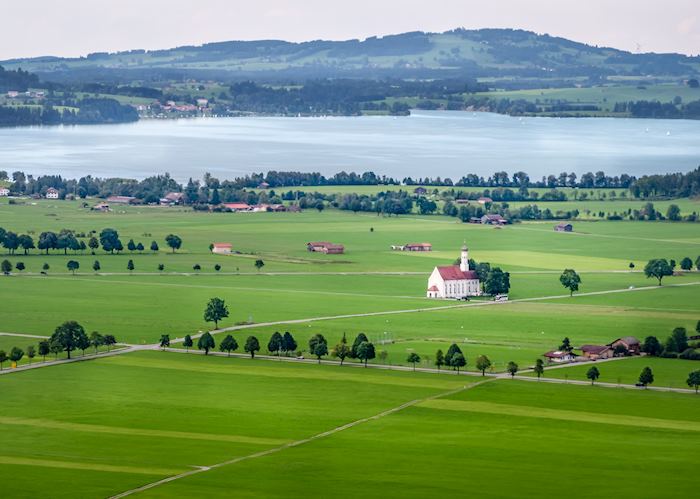Turquoise cupulas, artificial stalactites, Alpine views and homages to a king’s preferred composer, all at Neuschwanstein Castle.

Perched on a craggy hillside overlooking the village of Hohenschwangau, Neuschwanstein Castle offers you a glimpse into King Ludwig II’s whimsical tastes. With spiked turrets that mirror the distant mountain peaks, the castle was built specifically by the king in recognition of composer Richard Wagner, whom he greatly admired.
The interior is filled with homages to the composer, including walls of frescoes depicting scenes from the legends that inspired Wagner’s operas, and a theatre permanently featuring the set of one of his works.
Ludwig II wanted Neuschwanstein to be his fantastical medieval escape, but the romantic, Romanesque castle was built with all the modern amenities available in the late 19th century, like central heating, running water, flushing toilets, telephones and an elevator.
The castle, which is easy to visit from Munich, was featured in the 1968 film Chitty Chitty Bang Bang and served as the inspiration for Disneyland’s classic castle logo.
Things to see and do in Neuschwanstein
Marienbrücke
A footbridge wedged between two sheer cliffs, Marienbrücke offers the best views of Neuschwanstein. Situated 90 m (295 feet) over the Pöllat river, the bridge is not for the faint of heart. Marienbrücke is a short walk from where the shuttle drops you off at the entrance of the castle.
Throne Room
Anchored by a towering chandelier, Neuschwanstein’s throne room was inspired by Byzantine churches, particularly the All Saints Court Church in Munich. The room was designed as a combination of throne room and church, though the throne was never constructed due to the premature death of King Ludwig II.
The king’s belief that he was a mediator between God and the rest of the world can be seen in design details like the turquoise-painted cupola decorated with gold stars, and the floor mosaic that depicted plants and animals.
The room is incredibly opulent and the intricately painted walls are lined with blue and plum columns, with glimmering gold throughout.
Grotto and conservatory

Make your way to the grotto, an artificial dripstone cave inspired by the Hörselberg in the Tannhäuser opera Wagner wrote. A glass door lowers into one of the rocks, inviting you from the grotto to the conservatory.
The conservatory, intended to be a Moorish hall but never completed, offers panoramic views of the Alpine foothills. The large glass windows were uncommon at the time the castle was built, and offer uninterrupted views across the valley below.
Bedroom
King Ludwig II’s bedroom was extremely extravagant and opulent. The leitmotif is the legend of Tristan and Isolde, based on Wagner’s opera of the same name. The two main characters feature in murals on the walls, carvings on the door and ceramic figures on the tiled stove.
The focal point of the room is the dark, ornately crafted wooden bed in a neo-Gothic style, dressed in bright blue silk bedding. The seat covers on the nearby chairs feature the same blue silk, with lions, swans, crowns, lilies and the Bavarian coat of arms in embroidery and appliques.
Horse and carriage
After your tour, we can arrange for you to take a horse and carriage ride back down the hill from the castle. The views of the surrounding area are peaceful, and the carriage is the best way to see it. If you don’t take the horse and carriage back down to the parking area, you will have walk, which takes about 25 minutes.
Best time to visit Neuschwanstein
The castle is extremely busy during July and August because of school summer holidays. We recommend visiting on a weekday in October or November, or from March to May before Easter.
who's been there
Start planning your tailor-made trip to Neuschwanstein by contacting one of our Germany specialists
-
01993 838 92501993 838 367
- Make an enquiry
Places near Neuschwanstein
- Munich 52 miles away
- Bavaria 93 miles away
- Titisee 124 miles away
- Rothenburg 129 miles away
- The Black Forest 129 miles away
- Nuremberg 131 miles away
- Freiburg 139 miles away
- Baden-Baden 149 miles away
- Heidelberg 161 miles away
- Frankfurt 201 miles away
- Oberwesel 225 miles away
- The Rhine Valley 242 miles away
- Dresden 276 miles away
- Cologne 290 miles away











